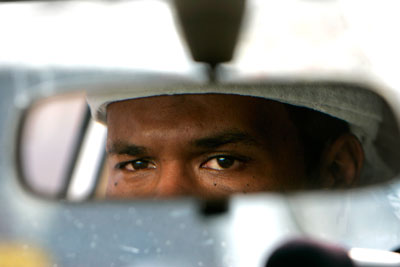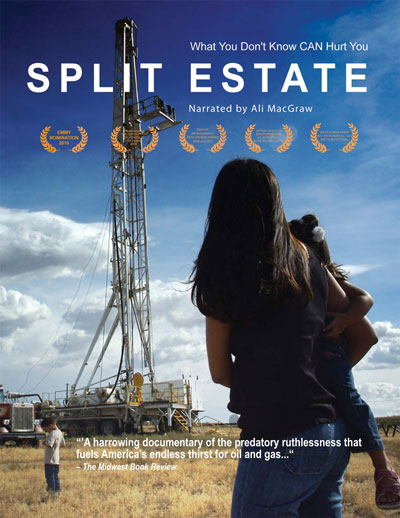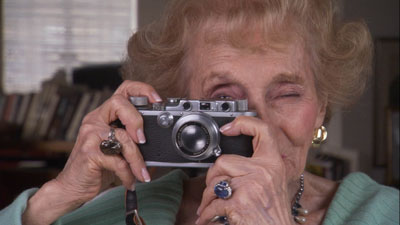THE OATH tells the story of Abu Jandal, Osama bin Laden’s former bodyguard, and Salim Hamdan, a prisoner at Guantanamo Bay Prison and the first man to face the controversial military tribunals. Filmed in Yemen and Guantanamo Bay, Cuba, THE OATH is about two men whose fateful encounter in 1996 set them on a journey that would lead to Osama bin Laden, 9/11, Guantanamo Bay Prison, and the U.S. Supreme Court. The film begins as Salim Hamdan is set to face war crime charges at Guantanamo, and Abu Jandal is a free man who drives a taxi in Yemen. We enter the story in a taxicab in Yemen. Here we meet Abu Jandal, the film’s central protagonist, as he transports passengers through the chaotic streets of Yemen’s capital city, Sana’a. Salim Hamdan is the film’s “ghost” protagonist. He was arrested in Afghanistan shortly after 9/11 and taken to Guantanamo. His seven-year captivity at Guantanamo is narrated through his prison letters. Abu Jandal met Salim Hamdan in 1996 outside a mosque in Yemen while looking for men to join him for jihad in Tajikistan. An orphan with a fourth grade education, Hamdan was drawn to the charismatic Abu Jandal. With the promise of work and friendship, Hamdan joined Abu Jandal. Their journey took them to Afghanistan. Osama bin Laden had just relocated there from the Sudan and he invited the men to visit. Abu Jandal joined Al-Qaeda and became bin Laden’s bodyguard and guesthouse emir. Salim Hamdan was hired as bin Laden’s driver. The second act of THE OATH takes us to Guantanamo, where Salim Hamdan’s military tribunal unfolds. Hamdan’s case is well known: In 2006, the U.S. Supreme Court ruled in his favor in the landmark case of HAMDAN v. RUMSFELD. Hamdan’s Supreme Court victory, however, did not lead to his release, but rather to Congress re-drafting the law on military tribunals and creating new charges to file against him. The final act of THE OATH returns to Yemen and takes us inside the pivotal FBI interrogation of Abu Jandal conducted six days after 9/11. THE OATH concludes with the surprising outcome of Hamdan’s tribunal and his return home to Yemen. Through the story of Abu Jandal and Salim Hamdan, THE OATH offers American and western audiences a rare window into the world of Al Qadea, Osama bin Laden, Guantanamo Bay Prison, and the international impact of the United States’ “War on Terror.”
Summary info for schedule – will be hidden on film page

The Oath
96-minutes
Screening day / time
The Oath
The Oath
Filmmaker Notes:
I was first interested in making a film about Guantanamo in 2003 when I was also beginning a film about the war in Iraq. I never imagined Guantanamo would still be open when I finished that film, but sadly it was—and still is. Originally, my idea was to make a film about someone released from Guantanamo and returning home. In May 2007, I traveled to Yemen and that’s when I met Abu Jandal, Osama bin Laden’s former bodyguard, who drives a taxi in Yemen. I wasn’t looking to make a film about Al-Qaeda—I really wanted to tell the story of a Guantanamo prisoner returning home, but the story changed when I met Abu Jandal. Themes of family, guilt, betrayal, regret, loyalty, absence, etc, are not typically things that come to mind when we imagine a film about Al-Qaeda and Guantanamo, so the story compelled me. It was a way to confront the traumatic events of the past nine years. THE OATH is the second documentary in a trilogy I am working on about America post 9/11. The first film, MY COUNTRY, MY COUNTRY, tells the story of the U.S. occupation of Iraq from the perspective of an Iraqi doctor. The final film will be set in the U.S., focusing on the 9/11 trials. In each film, my goal has been to understand these world events through the stories of the people living them. I also want the films to serve as primary documents. As a nation, I don’t think Americans have begun to come to terms with 9/11 and its repercussions (Guantanamo, the invasion or Iraq, legalization of torture, etc.). If the United States and other western nations hope to confront and contain the threat of Al- Qaeda, we must understand its motivations and internal divisions. To do that requires first seeing Islamic radicals as real people—subject to the human condition rather than apart from it. To acknowledge that humanity is not a justification of their acts, but rather an acceptance of an uncomfortable reality. In the nine years since the terrorist attacks of 9/11, Al-Qaeda has grown from a fringe terrorist organization into an international social movement that is being “franchised” worldwide. In these same nine years, the United States has launched two wars, participated in the legalization of torture, detention without trial, “extraordinary rendition,” and secret prisons. The world will be grappling with the twin tragedies of 9/11 and America’s reaction to the attack for generations to come. THE OATH is an effort to document and shine light on this historical moment.



